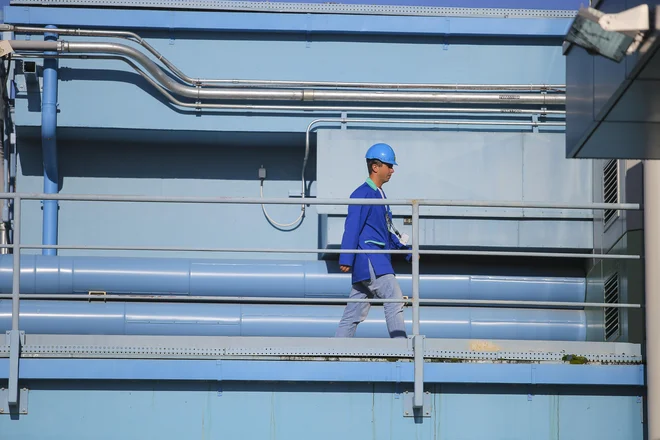Much more space on the power grid for companies reports Tennet – if outside peak hours
/s3/static.nrc.nl/images/gn4/data130524943-2439c9.jpg)
For a change, good news about the crowded power grid in the Netherlands. Network manager Tennet shared a new strategy on Monday to shorten the endless waiting list of companies that want a new or heavier connection to the electricity grid, for example to make it more sustainable. Tennet will offer a new type of energy contract with which companies only get the ‘leftovers’ electricity that remain outside peak hours. There is often no place for new regular connections, for companies that only use capacity under this new contract outside the peak.
With the new contracts, Tennet can divide space on the electricity grid that is not being used over new companies. It concerns 9.1 Gigawatt (GW) to newly liberated capacity. For comparison: an average nuclear reactor has a capacity of 1 GW.
Bottleneck in energy transition
The overcrowded power grid is one of the most stubborn bottlenecks in the energy transition. To achieve climate goals, the Netherlands, just like surrounding countries, has to get rid of fossil fuels and switch to sustainable electricity. More and more companies want to electrify, but the power grid in the Netherlands is full almost everywhere. In other words: there is now not enough space on the electricity grid to transport all sustainably generated electricity from source to user during rush hour. The queue of future TenneT customers is increasing every day.
Tennet manages the high -voltage network: the ‘heavy’ network, 380,000, 220,000, 150,000 or 110,000 volts. Households are not (directly) connected to this; The largest large consumers and large energy producers such as Tata Steel and the nuclear power plant in Borsele. And also regional network operators who ultimately deliver electricity in the right, lower, voltage to smaller companies and households.
Tennet is building billions of euros on extra cables and stations to give (new) customers an (extra) connection. But the increase in supply cannot keep up with the rapidly rising demand.
Residual capacity
Now Tennet, together with the Netherlands Authority for Consumers & Markets, with a contract, comes a so -called duration -related contract to better use the existing capacity. Customers may only use the residual capacity outside the peak. Yes, the power grid is on the maximum capacity during the peak times (such as between 4 p.m. and 8 p.m.) with the number of current customers. That is why there are no more traditional contracts in many places. But with this new contract, unlike with the traditional contract, it is agreed that new customers only use capacity outside peak times.
What does that contract look like? Companies receive rights to take power or to deliver it to the network during a predetermined number of hours per year. It concerns at least 85 percent of the hours that are in a year. « During the remaining 15 percent of the time, TenneT, for example at expected peak times, can impose a (partial) restriction in the decrease in the decrease or introduction of electricity, » writes the network operator. « TenneT shares these limitations at least one day in advance with the customer. » That limitation is probably enforced with a fine.
And so Tennet can award 9.1 GW to the companies that are on the waiting list. 9.1 GW accounts for around 40 percent of the capacity that is requested in the Netherlands during peak hours.
Discount on net rates
Flexibility is a general trend in the energy world. In a future in which electricity will no longer automatically come out of the socket in the Netherlands at any time, network operators have been calling for a long time to deal with capacity more economically and more flexibly. There is also something in return. Companies with a duration -related contract receive discounts on the net rates (part of the energy bill) of up to 65 percent.
Duration -bound contracts are especially interesting for companies that can handle their capacity flexibly, such as battery systems, the process industry and companies with their own emergency facilities. It is less suitable for companies that need a continuous electricity electricity, such as data centers.
Companies have submitted a total of 70 GW to applications for this new contract. It must be stated that this is an unrealistic amount: there are many large -scale battery parks that make multiple requests that they will not all use. Not every applicant will still get a connection.
Giga Storage was the first to sign such a new contract for a large -scale battery installation in Delfzijl. In the coming months, TenneT will distribute the space on the net. First Come First Serve« Taking into account social priorities. » It has been agreed with the ACM that, for example, the police will be given priority for applications. The new contracts must take effect from October.

/s3/static.nrc.nl/images/gn4/data133009942-8ac92b.jpg)
:format(webp)/s3/static.nrc.nl/wp-content/uploads/2024/12/20123214/data125690560-fdc759.jpg)
:format(jpeg):fill(f8f8f8,true)/s3/static.nrc.nl/taxonomy/bf9b707-commentaar-itemafbeelding-2024.png)




